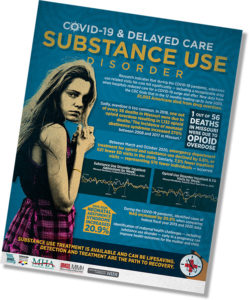Expert

Dave Dillon
Actions
Type
Topic
- COVID-19
- Maternal Health
- Opioids
Tags
JEFFERSON CITY, Mo. — New research finds that between March and October 2020, emergency department treatment for opioid and substance use declined by 5.6%, or 621 fewer ED visits in the state. Similarly, 7.5% fewer inpatient visits — representing 576 fewer individuals — occurred. At the same time, recent research from the Centers for Disease Control and Prevention found that in the 12 months leading to June 2020, 81,003 Americans died from drug overdose — the highest annual increase ever recorded.

“This early research identifies a drop in expected rates of care related to substance use disorders,” said Herb B. Kuhn, MHA President and CEO. “COVID-19 has created an environment where we would expect an increase in care for substance use, yet the data indicate that less care and treatment interventions are occurring. This is very troubling.”
Substance use-related visits for care fell significantly during the COVID-19 pandemic — including a recognizable drop when hospitals reduced care to protect patients and staff during the early months of the COVID-19 pandemic, and after. This reduced opportunity to identify SUD and help patients begin a path to recovery could be one factor contributing to the recent increase in both national and Missouri drug overdose prevalence.
In 2018, one out of every 56 deaths in Missouri were due to opioid overdose, resulting in 1,132 opioid deaths. Although current, state-specific data are not yet available from the CDC, the increasing toll of drug overdose in Missouri is well documented. Between 1999 and 2015, drug-induced deaths increased by 273% in Missouri. According to the CDC, overdose deaths were accelerating before the pandemic, in part due to the increase in the powerful synthetic opioid, fentanyl.
“Substance use challenges often are identified in a clinical environment — when a patient exhibits drug-seeking behavior or as a result of an overdose, for example” Kuhn said. “Conversations with expectant mothers during prenatal visits can provide an opportunity to identify substance use issues and establish a treatment and recovery plan to protect the mother and child.”
Substance use among expecting mothers can lead to neonatal abstinence syndrome in newborns. Earlier research suggests that NAS has expanded significantly in Missouri — increasing 270% between 2008 and 2017 in Missouri.
Researchers found that more than half of all babies born to mothers who either misused or were prescribed opioids to manage pain during pregnancy suffer from NAS. Opioid use can harm a developing fetus and lead to withdrawal symptoms after delivery. During the COVID-19 pandemic, identified cases of NAS increased 20.9% when comparing 2019 to 2020.
In addition to the human cost, there is a high health care cost. The average length of stay for a NAS newborn is 10 days longer than a non-NAS newborn. Moreover, in 2017-2018, the average hospital charge for a delivery in Missouri was $5,000, but NAS-related care was $33,000 per child — a 570% difference.
“COVID-19 didn’t eliminate substance use disorders, but it may have limited the ability of health care providers to identify them,” Kuhn said. “Missourians who know family, neighbors or friends who suffer from a substance use disorder who are not currently receiving treatment should encourage them to pursue care.”
This is the third installment in the ‘COVID-19 and Delayed Care’ series. Each investigates the influence of COVID-19 on delayed or forgone care. Previous releases included data on screenings for cancer, heart disease and diabetes, as well as well-child visits.
# # #
The Missouri Hospital Association is a not-for-profit association in Jefferson City that represents 140 Missouri hospitals. In addition to representation and advocacy on behalf of its membership, the association offers continuing education programs on current health care topics and seeks to educate the public about health care issues









